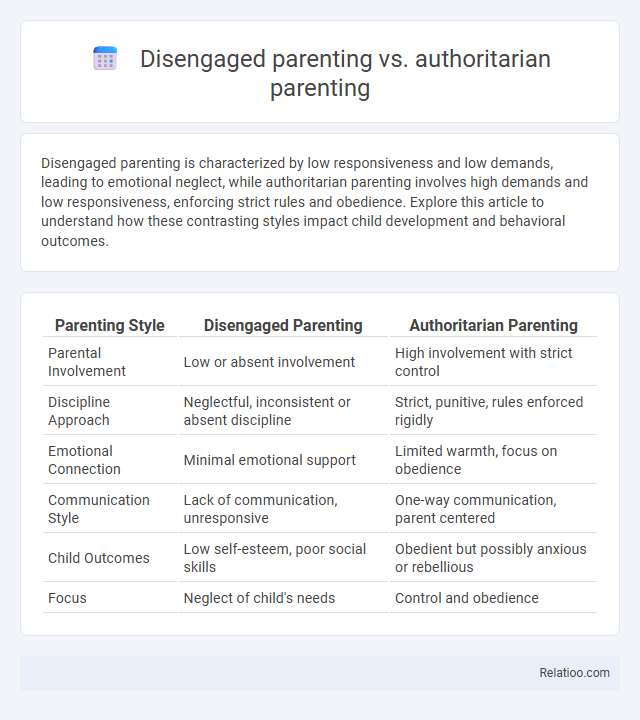Disengaged parenting is characterized by low responsiveness and low demands, leading to emotional neglect, while authoritarian parenting involves high demands and low responsiveness, enforcing strict rules and obedience. Explore this article to understand how these contrasting styles impact child development and behavioral outcomes.
Table of Comparison
| Parenting Style | Disengaged Parenting | Authoritarian Parenting |
|---|---|---|
| Parental Involvement | Low or absent involvement | High involvement with strict control |
| Discipline Approach | Neglectful, inconsistent or absent discipline | Strict, punitive, rules enforced rigidly |
| Emotional Connection | Minimal emotional support | Limited warmth, focus on obedience |
| Communication Style | Lack of communication, unresponsive | One-way communication, parent centered |
| Child Outcomes | Low self-esteem, poor social skills | Obedient but possibly anxious or rebellious |
| Focus | Neglect of child's needs | Control and obedience |
Understanding Disengaged Parenting
Disengaged parenting is characterized by low responsiveness and low demandingness, leading to minimal communication and emotional connection with Your child. Unlike authoritarian parenting, which enforces strict rules and high control, disengaged parents are often uninvolved or indifferent, resulting in potential developmental and behavioral issues in children. Understanding disengaged parenting helps identify the need for increased parental engagement to foster healthier emotional and social growth.
Key Characteristics of Disengaged Parents
Disengaged parents exhibit low responsiveness and low demandingness, often showing minimal involvement in their child's life and basic needs. Your child may experience neglect, lack of emotional support, and inconsistent discipline under disengaged parenting, which contrasts sharply with authoritarian parenting's high control and low warmth or authoritative parenting's balanced responsiveness and structure. These key characteristics of disengaged parents contribute to emotional detachment and limited guidance, impacting your child's social and emotional development.
Defining Authoritarian Parenting
Authoritarian parenting is characterized by strict rules, high demands, and low responsiveness, where parents expect obedience without questioning and often use punishment to enforce discipline. Disengaged parenting, in contrast, involves low responsiveness and low demands, with parents being emotionally detached and uninvolved in their child's life. Unlike disengaged parents, authoritarian parents are highly controlling but lack the warmth and open communication essential for healthy child development.
Core Traits of Authoritarian Parenting
Authoritarian parenting is characterized by strict rules, high expectations, and little warmth or flexibility, enforcing obedience through punishment rather than reasoning. Core traits include rigid discipline, low responsiveness, and a clear emphasis on authority and control over the child's behavior. Understanding these traits helps you differentiate authoritarian parenting from disengaged parenting, which lacks emotional involvement, and authoritative parenting, which balances discipline with support.
Emotional Impact on Children
Disengaged parenting often leads to children feeling neglected and emotionally detached, resulting in low self-esteem and difficulties in forming healthy relationships. Authoritarian parenting causes heightened anxiety and fear in children, as strict rules and punishment limit emotional expression and self-confidence. Your approach shapes your child's emotional well-being profoundly, with balanced parental involvement fostering security and emotional resilience.
Academic and Behavioral Outcomes
Disengaged parenting often results in poor academic performance and increased behavioral problems due to a lack of guidance and emotional support. Authoritarian parenting, characterized by strict rules and high demands, may lead to compliance but can suppress creativity and promote anxiety or aggression in children. In contrast, authoritative parenting, combining warmth with firm boundaries, consistently associates with better academic achievement and positive social behaviors.
Parent-Child Communication Styles
Authoritarian parenting features strict rules and limited open communication, leading to low child expression and often high obedience but reduced emotional warmth. Disengaged parenting neglects parent-child interaction, resulting in minimal communication and emotional detachment, which can harm child development and trust. In contrast, authoritative parenting encourages balanced, open dialogue with clear boundaries, fostering healthy emotional connections and effective communication skills.
Long-Term Effects on Child Development
Disengaged parenting often results in children exhibiting low self-esteem, poor social skills, and increased risk of substance abuse due to a lack of emotional support and guidance. Authoritarian parenting, characterized by strict rules and little warmth, may lead to obedient yet emotionally suppressed children who struggle with anxiety and impaired social competence. In contrast, authoritative parenting, blending firm boundaries with responsiveness, fosters higher academic achievement, better emotional regulation, and stronger interpersonal relationships over the long term.
Strategies for Healthy Parenting Balance
Striking a healthy parenting balance involves combining authoritative strategies such as consistent boundaries and open communication with the empathy found in authoritative parenting while avoiding the extremes of disengaged or authoritarian styles. Implementing responsive discipline and fostering emotional support helps promote child development without the rigidity of authoritarian control or the neglect of disengaged parenting. Prioritizing active involvement alongside respect for autonomy encourages a nurturing environment conducive to psychological well-being and social competence.
Choosing the Right Parenting Approach
Choosing the right parenting approach involves understanding the distinct characteristics of disengaged, authoritarian, and authoritative styles, as each impacts child development differently. Disengaged parenting, marked by low responsiveness and minimal involvement, often leads to emotional and social difficulties in children, while authoritarian parenting emphasizes strict discipline and obedience, potentially causing reduced self-esteem and increased anxiety. Authoritative parenting balances firm boundaries with emotional support, fostering independence, self-regulation, and healthy social skills, making it the most effective approach for positive long-term outcomes.

Infographic: Disengaged parenting vs Authoritarian parenting
 relatioo.com
relatioo.com